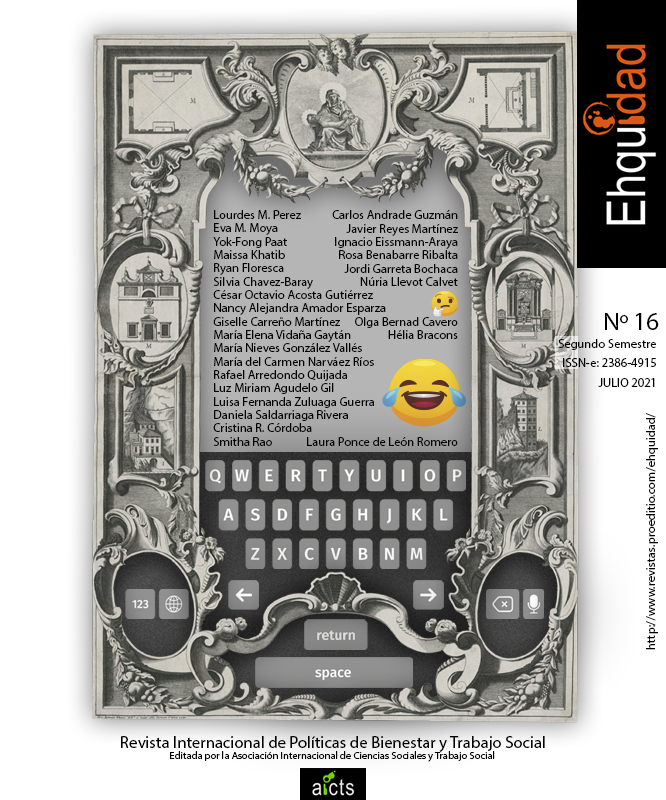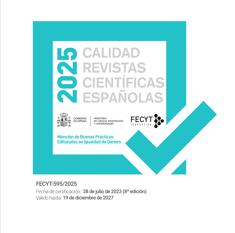Use of English in Ph.D. programs in Social Work in the United States. An illustrative case study of idiomatic hegemony
DOI:
https://doi.org/10.15257/ehquidad.2021.0018Keywords:
English Language-Hegemony, Social Work Doctoral Education, Discrimination, Diversity in Social Work Education, United StatesAbstract
This study reviews the experiences of non-native English-speaking students in Doctoral Social Work Education in the United States. The research, through a qualitative case study, interrogates regarding the centrality of English in education processes, and generates recommendations for improving them. Findings show that English can play a hegemonic role in Social Work Education and that some educators can exert discrimination based on language proficiency. Among recommendations are the need to promote reflexivity to contribute that educators reconnect with discipline principles as well as review the way their power is exerted in the classroom.
Downloads
References
Altbach, P. (2015). The Imperial Tongue: English as the Dominating Academic Language. International Higher Education, 49. https://doi.org/10.6017/ihe.2007.49.7986
Anderson, T. (1988). Black Encounter of Racism and Elitism in White Academe: A Critique of the System. Journal of Black Studies, 18(3), 259–272.
Andreotti, V. (2007). An Ethical Engagement with the Other: Spivak’s ideas on Education. Critical Literacy: Theories and Practices, 1(1), 69–79. www.criticalliteracy.org.uk%0Awww.criticalliteracy.org.uk/journal
Askeland, G. A. & Payne, M. (2006). Social work education’s cultural hegemony. International Social Work, 49(6), 731–743. https://doi.org/10.1177/0020872806069079
Braun, V. & Clarke, V. (2006). Using thematic analysis in psychology. Qualitative Research in Psychology, 3(2), 77–101. https://doi.org/10.1038/sj.ijir.3900760
Brown, L. & Jones, I. (2013). Encounters with racism and the international student experience. Studies in Higher Education, 38(7), 1004–1019. https://doi.org/10.1080/03075079.2011.614940
Darder, A. (2018). Decolonizing interpretive research: subaltern sensibilities and the politics of voice. Qualitative Research Journal, 18(2), 94–104. https://doi.org/10.1108/QRJ-D-17-00056
Demont-Heinrich, C. (2010). Linguistically privileged and cursed? American university students and the global hegemony of English. World Englishes, 29(2), 281–298. https://doi.org/10.1111/j.1467-971X.2010.01645.x
Duru, E. & Poyrazli, S. (2011). Perceived discrimination, social connectedness, and other predictors of adjustment difficulties among Turkish international students. International Journal of Psychology, 46(6), 446–454. https://doi.org/10.1080/00207594.2011.585158
Flaherty, C., Ely, G. E., Meyer-Adams, N., Baer, J. & Sutphen, R. D. (2013). Are Social Work Educators Bullies? Student Perceptions of Political Discourse in the Social Work Classroom. Journal of Teaching in Social Work, 33(1), 59–74. https://doi.org/10.1080/08841233.2012.750259
Ginocchio, F. L. (1982). The Problems of Bias in the Teaching of Social Studies. The Clearing House: A Journal of Educational Strategies, Issues and Ideas, 55(7), 311–314. https://doi.org/10.1080/00098655.1982.10113685
International Federation of Social Workers. (2019). Global Social Work statement of ethical principles. https://www.ifsw.org/global-social-work-statement-of-ethical-principles/
Ives, P. (2009). Global English, hegemony and education: Lessons from Gramsci. Educational Philosophy and Theory, 41(6), 661–683. https://doi.org/10.1111/j.1469-5812.2008.00498.x
Jordán Sierra, J. A. & Alcántara, A. C. (2019). La influencia del profesor apasionado en la mejora académica y el desarrollo personal de sus alumnos. Estudios Sobre Educacion, 36, 31–51. https://doi.org/10.15581/004.36.31-51
Marradi, A., Archenti, N. & Piavoni, J. (2010). Metodología de las ciencias sociales. Cengage learning Argentina.
National Association of Social Workers - NASW. (2017). Code of Ethics of the National Association of Social Workers.
Nicholson, J. (2012). Gramsci and education. Journal of Romance Studies, 12(3), 90–96.
Rabadán, M. & Orgambídez, A. (2018). Ansiedad idiomática y motivación hacia el español como lengua extranjera en estudiantes universitarios portugueses: un estudio exploratorio. Estudios Sobre Educacion, 35, 517–533. https://doi.org/10.15581/004.34.517-533
Saltzburg, S. (2015). Pedagogy for unpacking heterosexist and cisgender bias in social work education in the United States. In J. Fish & K. Karban (Eds.), LGBT health inequalities: International perspectives in social work (pp. 205–222). Bristol University Press, Policy Press. https://doi.org/10.2307/j.ctt1t89jh6.20
Spivak, G. C. (1988). Can the Subaltern Speak? In C. Nelson & Lawrence Grossberg (Eds.), Marxism and the interpretation of culture (pp. 1–96). Urbana?: University of Illinois Press. https://doi.org/10.4324/9781912281770
Stake, R. (1999). Investigación con estudio de casos. Ediciones Morata.
Downloads
Published
Versions
- 2021-07-11 (2)
- 2021-07-05 (1)












